Reject U.S. Impunity
• Wikileaks, Humiliation and U.S. Crimes
• Federal Workers Targeted and Air Force Blocks Sites Posting Wikileaks
• If You Read WikiLeaks, You Are Breaking the Law • Espionage, Propaganda, and Disinformation •
Leaks Expose U.S. Intervention in Honduras Coup d'État •
We Condemn in the Strongest Terms the Unauthorized Disclosure of Documents by Wikileaks
Wikileaks, Humiliation and U.S. Crimes
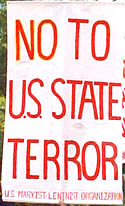 The Wikileaks release of about 250,000 State Department documents, most unclassified, has confirmed the criminal character of the U.S. state. They have provided yet more proof of the involvement in coups in Haiti and Honduras, repeated efforts to impose regime change on Venezuela and Cuba, massive illegal U.S. spying, including on diplomats, blocking other countries from pursuing criminal cases against the CIA for kidnapping, rendition and torture, use of outlawed cluster bombs, crimes against the peace of planning and fomenting aggressive war against Iran and war crimes in Iraq and Afghanistan — and more.
The Wikileaks release of about 250,000 State Department documents, most unclassified, has confirmed the criminal character of the U.S. state. They have provided yet more proof of the involvement in coups in Haiti and Honduras, repeated efforts to impose regime change on Venezuela and Cuba, massive illegal U.S. spying, including on diplomats, blocking other countries from pursuing criminal cases against the CIA for kidnapping, rendition and torture, use of outlawed cluster bombs, crimes against the peace of planning and fomenting aggressive war against Iran and war crimes in Iraq and Afghanistan — and more.
In the face of this evidence, coming directly from government documents, one would think the government would sober up and at least condemn the crimes and begin to hold those responsible accountable. Instead, the government has gone on the offensive against federal workers for reading the documents, against the New York Times and other websites for publishing them, and against Wikileaks itself for releasing them. Despite the fact that the materials have been published worldwide and cannot in any way be considered “classified,” the government is making it a crime for federal workers to simply read these public materials, even at home on their own computers. The Air Force has blocked the New York Times and more than 25 other websites on all its computers. The Library of Congress has blocked Wikileaks and the Department of Commerce issued a memo telling all its employees not to access Wikileaks.
All of these attacks on the rights to speech and the press are being done in the name of national security. According to the government, the problem is not its crimes and the need to take action to stop them. No, the problem is, as the White House put it, the “reckless and dangerous action” by Wikileaks that has put at risk “the cause of human rights.”
 The very least required to begin stopping the "reckless and dangerous actions" of the U.S. government that have caused grave human rights violations at home and abroad is to: Bring All U.S. Troops Home Now so as to end the criminal wars and occupations; end racist mass incarceration, the genocide of the present inside the U.S.; and pay reparations for all U.S. crimes from slavery to today.
The very least required to begin stopping the "reckless and dangerous actions" of the U.S. government that have caused grave human rights violations at home and abroad is to: Bring All U.S. Troops Home Now so as to end the criminal wars and occupations; end racist mass incarceration, the genocide of the present inside the U.S.; and pay reparations for all U.S. crimes from slavery to today.
It has been brought out by many that the documents show beyond a doubt that the “Emperor has no clothes,” and U.S. crimes stand naked before the world. But perhaps more significantly, the U.S. response shows that the emperor does not care that the world sees its crimes. Indeed, it is flaunting the fact that it can rampage naked worldwide with impunity to commit crimes against the peoples. In this manner, the U.S. is using the Wikileaks release to humiliate Americans, to make them feel powerless before the crimes, to say that resistance is futile. And the government coupled this broad humiliation with that imposed by the full-body scanners at airports. It is using humiliation, backed up by repression, to force everyone to be repeatedly exposed to and forced to submit to broad measures against the public and against public discourse. The government, and particularly the executive office of the president, is dictating who can or cannot fly, what can and cannot be read, posted, even publicly discussed and debated.
[TOP]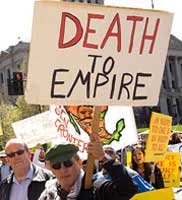 Humiliation and repression are a dangerous combination meant to keep the rich in power and the working class and people out of power. Loyalty to the president and what he determines does or does not represent a threat to national security is being instituted, using a combination of threats, repression and humiliation. The fact that places like the New York Times, diplomats and other top officials can be targeted and themselves also humiliated shows that the government will go after any and all it deems disloyal.
Humiliation and repression are a dangerous combination meant to keep the rich in power and the working class and people out of power. Loyalty to the president and what he determines does or does not represent a threat to national security is being instituted, using a combination of threats, repression and humiliation. The fact that places like the New York Times, diplomats and other top officials can be targeted and themselves also humiliated shows that the government will go after any and all it deems disloyal.
Loyalty to an emperor and completely undemocratic government has no place in modern society. U.S. impunity is the crime and empowerment of the people is the solution. Solving the problem of securing political power in the necessity. It is our society and our rights. Fighting for a democracy of our own making, with a Constitution that empowers the people to govern and decide is required.
More Government Attacks on Rights to Speech and Press
Federal Workers Targeted and Air Force Blocks Sites Posting Wikileaks
In response to the release by Wikileaks of about 250,000 mostly unclassified (i.e. not secret) government documents, the Air Force is now blocking access to the New York Times and other media sites that began publishing the documents. Air Force Major Toni Tones said more than 25 websites have been blocked and cannot be viewed by any Air Force computer. The ban so far does not apply to personal computers.
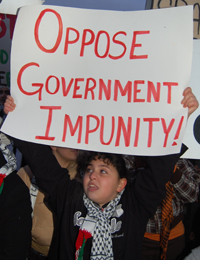 Tones said the action was taken by the 24th Air Force, which is commanded by Major General Richard Webber and is responsible for cyberwarfare and computer security for the Air Force. "If a site has republished the documents, then we block it," she said, adding that the move to prevent access to the media sites was done recently. The Army and Navy have not yet taken similar actions. The Department of Commerce also released a memo demanding that all employees and contractors not access any content from the WikiLeaks website. The Library of Congress has also blocked access to the website on its networks.
Tones said the action was taken by the 24th Air Force, which is commanded by Major General Richard Webber and is responsible for cyberwarfare and computer security for the Air Force. "If a site has republished the documents, then we block it," she said, adding that the move to prevent access to the media sites was done recently. The Army and Navy have not yet taken similar actions. The Department of Commerce also released a memo demanding that all employees and contractors not access any content from the WikiLeaks website. The Library of Congress has also blocked access to the website on its networks.
Major Tones said the New York Times is the only major U.S. newspaper included in the ban, but did not list other U.S. websites involved. Other newspapers include Der Spiegel in Germany, the Guardian in Britain and Le Monde in France. Any computer on the Air Force network is now unable to link to the sites. Tones also admitted that the 24th Air Force routinely blocks network access to websites that host what the military considers “inappropriate material.” In this manner the Air Force is conditioning its forces to accept limits imposed by the military concerning simply accessing public materials.
The Air Force action follows similar targeting of federal workers by the government. The White House on December 3 formally reminded all federal employees and government contractors that it is illegal for anyone without a security clearance to read classified documents, even on a personal computer at home outside work hours. And that the government considers all the Wikileaks material as “classified.” Simply reading such material as that released by Wikileaks and published by the New York Times and numerous other public websites is considered a “threat to national security.” Doing so could lead to firing and criminal charges.
The reminder was issued to all federal workers after the Wikileaks documents were made public on a worldwide basis and thus cannot in any way be considered “classified.” The threat to fire or charge workers then is not aimed at keeping classified materials classified. Instead it forces federal workers to submit to government dictate determining what federal workers can read on public websites, including in their homes. Federal workers are to accept that as federal workers, they do not have the same rights as other workers. And everyone is to accept this government attack on the rights to freedom of speech and the press involving material already in the public domain.
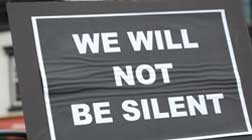 Federal workers have been the focus of such attacks in the past. Loyalty oaths, involving an extensive investigation of every federal worker, were demanded by President Truman in 1947. These loyalty oaths preceded the McCarthyite attacks of the 1950’s. Any federal worker refusing to take the oath was automatically fired. The oath equated disloyalty with being “subversive,” or simply “advocating revolution.” It also stated, “The standard for refusal of employment or the removal from employment” on grounds relating to loyalty included “Membership in, affiliation with or sympathetic association with any foreign or domestic organization, association, movement, group or combination of persons, designated by the Attorney General as totalitarian, fascist, communist, or subversive, or as having adopted a policy of advocating or approving the commission of acts of force or violence to deny other persons their rights under the Constitution of the United States, or as seeking to alter the form of government of the United States by unconstitutional means.”
Federal workers have been the focus of such attacks in the past. Loyalty oaths, involving an extensive investigation of every federal worker, were demanded by President Truman in 1947. These loyalty oaths preceded the McCarthyite attacks of the 1950’s. Any federal worker refusing to take the oath was automatically fired. The oath equated disloyalty with being “subversive,” or simply “advocating revolution.” It also stated, “The standard for refusal of employment or the removal from employment” on grounds relating to loyalty included “Membership in, affiliation with or sympathetic association with any foreign or domestic organization, association, movement, group or combination of persons, designated by the Attorney General as totalitarian, fascist, communist, or subversive, or as having adopted a policy of advocating or approving the commission of acts of force or violence to deny other persons their rights under the Constitution of the United States, or as seeking to alter the form of government of the United States by unconstitutional means.”
In the present situation the government is using the designation of “terrorist organization,” or “support for terrorism,” and “disloyalty” means anything the government determines is a “threat to national security.” These latest threats demand that federal workers be loyal to government dictate concerning reading materials in the public domain. They indicate that the government is gearing up to impose this demand for loyalty more directly and far more broadly.
[TOP]
If You Read WikiLeaks, You Are Breaking the Law
In the view of the U.S. government, many of the WikiLeaks documents are still classified, and reading classified documents without clearance is illegal. Critics say the warning is censorship.
Imagine you are a soldier in Iraq seeking to keep up with world events, so you forgo the TMZs of the cyberworld in favor of real news on a site like CBS or CNN or Fox. You click on a story about the WikiLeaks release of thousands of State Department cables – and up pops a government-placed box informing you that if you proceed to the story you will be breaking the law.
The federal government reasons that, published or not, the cables released by WikiLeaks are still classified documents. So it is warning employees from the Library of Congress to its far-flung foot soldiers not to access WikiLeaks and the mirror sites it and other information activists are feverishly setting up.
In some cases the warnings have extended even to accessing media reports about the disclosures. Accessing classified information without clearance is tantamount to breaking the law, the warnings go, and could damage one’s government career or even end it. Federal agencies are not blocking WikiLeaks and mirror websites, but some government employee advocates deem the warnings a form of censorship.
Secretary of State Hillary Rodham Clinton has made censorship-free Internet access a top priority of her dealings with countries like China, some rights activists note. But now that the shoe is on the other foot, they add, the U.S. government is violating its own policies.
The State Department was drawn into the censorship controversy after at least two universities warned students that they could be jeopardizing future diplomatic careers by accessing WikiLeaks documents still considered classified by the government.
A State Department employee and alumnus of Columbia University’s School of International and Public Affairs warned school officials that students interested in a diplomatic career should not access the documents, according to an e-mail sent to students last week. The State Department employee said that accessing or disseminating the documents “would call into question your ability to deal with confidential information,” according to the e-mail.
The State Department employee also advised against discussing the documents on social network sites like Facebook or Twitter, the e-mail said.
The Boston University School of Law's career services office issued a similar warning. It said the security clearances needed for many government jobs could be jeopardized by the unauthorized accessing of classified documents.
The State Department is stressing that any such warnings are not the official policy of the department. Spokesman P.J. Crowley told The Huffington Post that State Department employees were instructed "not to access the WikiLeaks site and download posted documents using an unclassified network, since these documents are still classified.” But he said “no advice” had been given to anyone beyond the department.
The Office of Budget and Management sent out a memo December 3 instructing federal agencies to review clearance levels, ensure that employees not have more access than necessary, and restrict the use of equipment such as flash drives.
The lengthy memo concludes with the rather Orwellian suggestion that “federal employees and contractors who believe they may have inadvertently accessed or downloaded classified or sensitive information on computers that access the web via non-classified government systems, or without prior authorization, should contact their information security offices for assistance.”
[TOP]
Espionage, Propaganda, and Disinformation
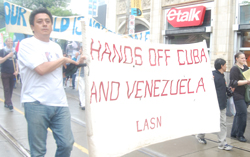 The first batch of recently released secret and confidential U.S. State Department documents obtained by WikiLeaks include over a dozen dispatches from the U.S. Embassy in Caracas, Venezuela, evidencing espionage against the Chavez administration, use of opposition media and politicians as informants and insulting remarks about the country.
The first batch of recently released secret and confidential U.S. State Department documents obtained by WikiLeaks include over a dozen dispatches from the U.S. Embassy in Caracas, Venezuela, evidencing espionage against the Chavez administration, use of opposition media and politicians as informants and insulting remarks about the country.
The WikiLeaks release last Sunday, November 28, of over a quarter million U.S. State Department cables has caused scandals worldwide over the methods, perspectives and dirty maneuvering of U.S. foreign policy. Almost no country or government is exempt from mention in the thousands of documents, which are being released over a period of months in order to appreciate the quality of the information, while also subjecting Washington to a type of prolonged torture.
The first several hundred documents made public primarily originate from U.S. embassies in Europe and the Middle East, as well as directly from the State Department and Secretary of State Hillary Clinton herself. But WikiLeaks founder Julian Assange, classified as a "terrorist" and "enemy combatant" [by the former Speaker of the House Newt Gingrich], has also released a select group of cables from U.S. embassies in Latin America.
Approximately 14 documents so far have been published that were dispatched by the U.S. Embassy in Caracas, though several other cables from different U.S. embassies worldwide reference Venezuela and President Hugo Chavez. Of the documents released, the majority refer to Washington's obsession with Venezuela's relations with two particular countries: Cuba and Iran.
Propaganda Campaign
In 2008, the U.S. Embassy in Caracas decided it was time to employ the heavy services of the Pentagon's psychological operations team to bombard Venezuelans with pro-U.S. propaganda, to counter, what an Embassy cable [called] in March 2008, "Chavez's anti-Americanism."
"Embassy Caracas requests DOD (Department of Defense) support in the execution of its strategic communications plan. The goal for this program is to influence the information environment within Venezuela... DOD support would greatly enhance existing Embassy Public Diplomacy and pro-democracy activities."
Influencing the "information environment" in Venezuela with Pentagon support is clearly an outright violation of Venezuela's sovereignty, which appears to be a common denominator in most of the Embassy cables published so far on Venezuela. The State Department's 2011 budget includes a special multimillion-dollar fund for a "30-minute, 5-day a week program in Spanish in Venezuela" and the Pentagon's includes a new program for "psychological operations" in the Southern Command (Latin America).
Attacking Healthcare, Foreign Policy
The first published on Venezuela by WikiLeaks criticizes Venezuela's successful healthcare program, Barrio Adentro, by claiming it is "usurping funds from the public hospital system." The cable, which was authored by former U.S. Ambassador Patrick Duddy in December 2009, quotes only anti-Chavez sources, including a journalist from the opposition newspaper, El Universal, and several doctors working in private clinics and public hospitals.
There is little serious mention of the billions of dollars the Venezuelan government has pumped into the public hospital and healthcare system in order to not only renovate older facilities left in disarray by former governments, but also to create a new healthcare system — which the Embassy cable cynically calls "parallel" — to guarantee free, universal care to all Venezuelans.
At the end of the cable, Duddy's comments show either ignorance or an intentional distortion of fact, when he claims, "The quality of healthcare in Venezuela has declined as the GBRV (Government of the Bolivarian Republic of Venezuela) has shifted resources from the traditional medical system to "Barrio Adentro." The hard evidence shows the contrary. For the first time in the nation's history, all Venezuelans have access to quality, free healthcare, from the preventive care level, up to complex, high-tech treatments and interventions.
Informants and Spies
The Embassy cables on Venezuela do not just reveal a distortion of Venezuela's reality, which is an attempt to portray the Chavez administration in a negative light. They also provide insight into who the U.S. government sources are and how U.S. diplomats operate as spies in the country.
One document, a scathing analysis of the alleged Cuban presence in Venezuela's intelligence services and a host of other government institutions, would at first glance be alarming. The cable, cynically titled "Cuba/Venezuela Axis of Mischief: The View from Caracas," was written by notorious former Ambassador William Brownfield in January 2006, and claims Cubans have penetrated almost every aspect of Venezuela's government, culture and economy. It is reminiscent of Cold War era fear-mongering about the "communist expansion" and "red scare" in the hemisphere. This time, however, instead of the Russians, it is the "Cubans are coming...they are everywhere." Be alarmed, be very alarmed.
Except that, when read in detail, it becomes clear that the sources behind this alleged "Cuban communist takeover" are actually high-profile opposition leaders, such as ex-Governor and now fugitive from justice, Manuel Rosales, big business executives and journalists from anti-Chavez media.
Brownfield even writes in the cable statements, such as, "Anecdotal reporting suggests..." "Less reliable reports indicate..." and "Unconfirmed sensitive reporting suggests..." evincing the weakness of the information provided, which was marked "Secret/No Foreign Distribution" and was sent to the Secretary of State, the National Security Council, the Pentagon's Southern Command (SOUTHCOM), and a host of other U.S. embassies and consulates ranging from Brasilia, La Paz, Lima, Managua, Quito, Buenos Aires, Santiago and Mexico, to Brussels, Lisbon, Madrid, Paris, London, Rome and The Hague.
Information that is unconfirmed, comes from exclusively biased sources (all anti-Chavez) and overall has no foundation in reality, is then used to craft U.S. policy toward Venezuela. The documents published by WikiLeaks evince that this dangerous scenario is repeated in U.S. diplomacy around the world.
The Caracas documents also evince how Embassy employees violate their status as diplomats to engage in espionage against the Venezuelan government. In the "Cuban scare" cable, Brownfield reveals that the Department of Defense monitors flight activity from Cuba to Venezuela daily, and then Embassy personnel try to gauge the number of passengers coming off the planes: "Embassy officers have noted regular flights of Cubans — or Venezuelans returning from official visits to Cuba — at Caracas' Maiquetia airport... Post cannot determine how many Cubans are on the flights..."
What Brownfield is most concerned about, apart from standing vigilant at the airport watching the planes come and go, is how the U.S. could be affected by the Cuba-Venezuela relationship. "The impact of Cuban involvement in Venezuelan intelligence could impact U.S. interests directly," he claims, concerned about "the expertise that Cuban services could provide...about the activities of the USG (U.S. Government)." More or less, Washington is worried their clandestine actions in Venezuela will be exposed as the Venezuelans improve their intelligence capacity.
In another document, titled "Explaining Venezuela's coziness with Iran," Ambassador Brownfield invokes the "Iran scare" and comments, "Venezuela's support for a country that has nuclear ambitions, supports terrorism and talks about wiping Israel off the map is of grave concern. It also alarms nations — such as France... We can exploit this alarm." How exactly would they do that? Interfere in Venezuela's relationship with France?
Brownfield remarks that Washington should not "dismiss the uranium rumors," referring to allegations that Venezuela was providing uranium to Iran to make bombs. But a later cable, written by the more steady-headed Charge D'Affairs John Caulfield in June 2009, contradicted Brownfield's war-mongering attitude. "Although rumors that Venezuela is providing Iran with Venezuelan produced uranium may help burnish the government's revolutionary credentials, there seems to be little basis in reality to the claims... it is highly unlikely that Venezuela is providing Venezuelan uranium to third countries."
Some of the information in the cables can be verified by fact and corroborating evidence, while other data remains in the realm of rumors and bogus sources. What is clear is that the documents reaffirm the increasing U.S. aggression against Venezuela and its hostile foreign policy against the Chavez administration, including a willingness to use unsubstantiated rumors to make dangerous accusations.
[TOP]
Leaks Expose U.S. Intervention
in Honduras Coup d'État
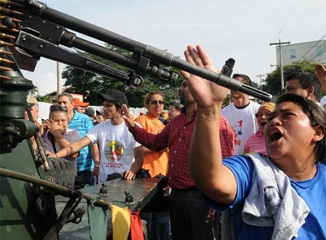 The 2009 coup d'état in Honduras was "illegal and unconstitutional," as Cuban-American Hugo Llorens, U.S. ambassador to Tegucigalpa, was forced to admit. Llorens is also a former collaborator of Otto Reich, whose role in the events remains to be seen. A report from Llorens to the State Department is among the U.S. documents leaked on November 28 by WikiLeaks.
The 2009 coup d'état in Honduras was "illegal and unconstitutional," as Cuban-American Hugo Llorens, U.S. ambassador to Tegucigalpa, was forced to admit. Llorens is also a former collaborator of Otto Reich, whose role in the events remains to be seen. A report from Llorens to the State Department is among the U.S. documents leaked on November 28 by WikiLeaks.
The document, signed by Llorens and sent to the State Department, also acknowledges that Zelaya's letter of resignation was a "fabrication," without giving details of the evidence confirming that. The U.S. ambassador confirmed that "none of the arguments mentioned" by the coup leaders to justify the kidnapping and deportation of the constitutional president, Manuel Zelaya, have any validity under the Honduran Constitution, while some are clearly false and others are "mere suppositions."
It shows how the accounts of Zelaya's arrest by the military demonstrate that he was never legally served with an arrest warrant, "that the soldiers gained entry by shooting the locks off, and essentially kidnapped the president."
Llorens makes no mention whatsoever of the complicity of the U.S. military forces present in Honduras in the operation carried out by elite troops from the Salvadorian army to fly the head of state out of the country. Eva Golinger, the Venezuelan-American lawyer and researcher, has demonstrated that, in the weeks following the coup, the Soto Cano Air Base which the United States maintains in Honduran territory played a fundamental role in overthrowing President Manuel Zelaya.
The document is one of hundreds of thousands of dispatches from the State Department leaked to the Spanish El País daily, the New York Times, the Guardian in Britain, the French Le Monde and the German Der Spiegel magazine, publications which are not known for criticizing the U.S. government.
In a tragicomic sounding paragraph, Llorens notes that "according to the logic of Article 239" invoked by the coup leaders, "Micheletti himself should be forced to step down because, as president of Congress he considered legislation to have a fourth ballot in the November 2009 elections for voter approval of a constituent assembly to rewrite the constitution."
Any member of Congress who debated the proposal also should be removed from office, and the presidential candidate of the National Party, Pepe Lobo, who made the idea his own, should be disqualified from taking public office for 10 years, he adds.
Llorens, Reich, Ros-Lehtinen and Co.
In his report, Llorens takes refuge behind Honduran legal experts that the embassy consulted in order to understand the arguments wielded by the coup supporters and their opponents.
It is a fact that many other documents, which are not "confidential" like this one, but "Top Secret," were exchanged between Washington and its embassy in Honduras during the events of 2009.
Llorens had advance notice of the coup. That was revealed by Roland Valenzuela, a former member of Zelaya's administration, a few days before his death in an interview broadcast by a radio station in the city of San Pedro Sula.
Valenzuela recounted in detail how, on June 10, 2009, Roberto Micheletti, at that time president of the National Congress, before seizing power on the 28th of that same month, drafted the decree, which would remove Zelaya from office.
He explained how a USAID contractor, Jacqueline Foglia Sandoval, was pointed to as "the person in charge of coordinating and executing the coup d'état."
A few days after his statements, Valenzuela was murdered in a public place by the businessman Carlos Yacamán, who was arrested on Wednesday, September 8 — not by the FBI, but by immigration authorities — in Miami, where he had taken refuge. Despite an official application for his extradition by the San Pedro Sula District Attorney's Office, Yacamán remains under the protection of U.S. authorities.
 Ambassador Hugo Llorens, who admitted after his report that he had participated in meetings in which coup plans were discussed before the kidnapping of President Zelaya, is a Cuban-American "terrorism" specialist. He was director of Andean Affairs at the National Security Council in Washington when the coup d'état against President Hugo Chávez took place.
Ambassador Hugo Llorens, who admitted after his report that he had participated in meetings in which coup plans were discussed before the kidnapping of President Zelaya, is a Cuban-American "terrorism" specialist. He was director of Andean Affairs at the National Security Council in Washington when the coup d'état against President Hugo Chávez took place.
Llorens directly reported to Otto Reich, assistant secretary of state for Western Hemisphere Affairs and the highly controversial Elliot Abrams.
Otto Reich is one of the most influential characters within the Miami mafia and in June of 2009, he was personally put in charge of protecting the Micheletti gang, together with Congresswoman Ileana Ros-Lehtinen.
Hugo Llorens' close relationship with U.S. foreign policy wolves no doubt explains far better than his confidential report the rapid turnabout in the diplomacy of Obama and Hillary Clinton.
In a statement on November 28, the ultra-right wing Cuban-American Congresswoman Ileana Ros-Lehtinen, who represents the Republican Party on foreign policy issues, described the revelation of these sensitive State Department documents by the WikiLeaks website as "irresponsible."
The Miami congresswoman has reason to be concerned: she flew to the support of the dictator Roberto Micheletti shortly after the coup d'état that led to the expulsion of the constitutional president, Manuel Zelaya.
"I am with the president of Honduras, Roberto Micheletti, because he is the president of this country," the spokeswoman for the extreme right in the U.S. Congress affirmed during a press conference with Micheletti in the government house in Honduras occupied by the dictatorship.
[TOP]
We Condemn in the Strongest Terms the Unauthorized Disclosure of Documents
by Wikileaks
We anticipate the release of what are claimed to be several hundred thousand classified State department cables on Sunday night, November 28, that detail private diplomatic discussions with foreign governments. By its very nature, field reporting to Washington is candid and often incomplete information. It is not an expression of policy, nor does it always shape final policy decisions. Nevertheless, these cables could compromise private discussions with foreign governments and opposition leaders, and when the substance of private conversations is printed on the front pages of newspapers across the world, it can deeply impact not only US foreign policy interests, but those of our allies and friends around the world. To be clear — such disclosures put at risk our diplomats, intelligence professionals, and people around the world who come to the United States for assistance in promoting democracy and open government. These documents also may include named individuals who in many cases live and work under oppressive regimes and who are trying to create more open and free societies. President Obama supports responsible, accountable, and open government at home and around the world, but this reckless and dangerous action runs counter to that goal. By releasing stolen and classified documents, Wikileaks has put at risk not only the cause of human rights but also the lives and work of these individuals. We condemn in the strongest terms the unauthorized disclosure of classified documents and sensitive national security information.
[TOP]
